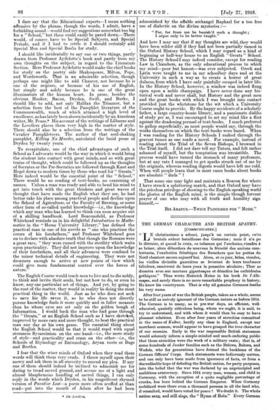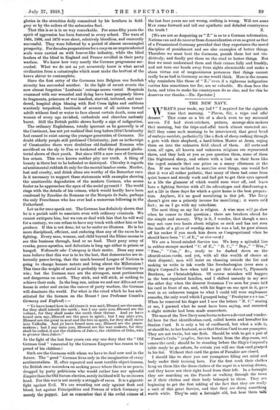THE GERMAN CHARACTER AND BRITISH APATHY.
[CommulticATED.]
" E christianisme a adouci, jusqu'a us certain point, et:1'A° I brutale ardeur batailleuse des Germains ; mais it n'a pu la detruire, et quand la croix, ce talisman qui l'enchaine,viendra se briser, alors debordera de nouveau la ferocite des anciens com- battants, l'exaltation frenetique des Bersekers quo lea poetes du Nord chantent encore aujourd'hui. Alors, et ce jour, helas, viendra, lea vieilles divinites guerrieres se levet:nit de leurs tombeaux fabuleux, essuieront de leurs yeux la poussiere seculaire; Thor se dressora avec son marteau gigantesque et demolira lea cathedrales gothiques." Thus wrote Heinrich Heine in his book De r Alle- magne, and surely there is no more remarkable prophecy in history. He knew his countrymen. That is why all genuine Germans loathe his very name.
After four years of war the British people, taken as a whole, seems to be still as naively ignorant of the German nature as before 1914. The German is to many, as in pre-war days, an efficient, well. educated, quaintly ridiculous being, whom we ought, it is said, to try to understand, and with whom it would then be easy to have pleasant relations. Even after four years of atrocities committed in the name of Kultur, hardly any class in England, except our merchant seamen, would appear to have grasped the true character of our enemies. Early in the war responsible British statesmen would solemnly inform a simple-minded and much-enduring public that these atrocities were the work of a military caste; that is, of some hundreds of Junker families such as the Thilows, Belows, and Wedels, who for generations have formed the backbone of the German Officers' Corps. Such statements were ludicrously untrue, and can only have been made from ignorance of facts, or from a discreditable hope of deluding the British nation, for party purposes, into the belief that the war was declared by an unprincipled and ambitious aristocracy. Since 1914 every man, woman, and child in Germany, with the exception of a quite negligible percentage of cranks, has been behind the German Emperor. When Germany mobilized were there even a thousand persons in all the land who, if oonsulted, would have voted for peace ? We doubt it. The whole nation sang, and still sings, the "Hymn of Hate." Every German
• glories in the atrocities daily committed by his brothers in field- grey or by the sailors of the submarine fleet. That this is so is in no way remarkable. For some fifty years the
spirit of aggression has been fostered in every schooL The wars of 1864, 1866, and 1870 were short, relatively bloodless, and eminently successful. They were followed by a period of almost unexampled prosperity. For decades preparations for a coup on an unprecedented
scale were carried on with beaver-like industry, while the blind leaders of the blind in England and France revelled in their party warfare. We know how very nearly the German programme suc- ceeded. What we do not as yet accurately know is what saved civilization from a catastrophe which must make the bra/rest of the brave shiver to contemplate.
Since the first entry of the Germans into Belgium one fiendish atrocity has succeeded another. In the light of recent events the now almost forgotten Lusitania ' outrage seems venial. Hospitals crammed with our wounded and dying have been purposely blown to fragments, prisoners of war insulted, starved, tortured, and mur- dered, hospital ships blazing with Red Cross lights and emblems wantonly torpedoed, boatloads of seamen of all nations turned adrift without food or water to face almost certain death, nuns and women of every age ravished, cathedrals and churches uselessly
burnt. Still the British public shows hardly a sign of indignation. The ordinary Englishman, totally ignorant as he generally is of the Continent, has not yet realized-that long before 1914 Christianity had ceased to exist among the younger generation of Germans. No
doubt elderly people still professed Christianity, just as in the reign of Constantine there were doubtless old-fashioned Romans who sacrificed on the sly to Pan or hankered after the pleasant gladia- torial shows of their youth. But since 1870 a new race of Germans has arisen. This race knows neither pity nor truth. A thing of beauty is there but to be befouled or destroyed. Chivalry it regards ad' sentimental rubbish fit only for the mental lumber-room. Murder, lust and cruelty, and drink alone are worthy of the Berserker race. Is it necessary to support these statements with examples showing the unutterable degradation of the modern German, who seems fouler as he approaches the apex of the social pyramid ? The world rings with the details of his crimes, which would hardly have been condoned by Ezzelino da Romano or the Marquis de Sade, perhaps the only Frenchman who has ever had a numerous following in the Fatherland.
Let us for once speak out. The German has definitely shown that he is a pariah unfit to associate even with ordinary criminals. We cannot extirpate him, but we can so deal with him that he will wail for a century, we can refuse to have any truck with either him or his produce. If this is not done, let us be under no illusions. He is far more disciplined, efficient, and enduring than any of the races he is fighting. Every man, woman, and child beyond the Rhine means to see this business through, food or no food. Their puny army of cranks, peace-apostles, and defeatists is long ago either in prison or hanged. Weltmacht oder Untergang is their motto. Does any sane man believe that this war is to be the last, that democracies are in- herently peace-loving, that the much-boomed League of Nations is going to change human nature and bring about the Millennium?
This time the weight of metal is probably too great for Germany to win ; but the German race are the strongest, most pertinacious and dangerous on earth. They stick, and will stick, at nothing to achieve their ends. In the long run, unless we and our Allies set our house in order and excise the cancer of party warfare, the German will dominate the world. For what is the creed which he has sub- stituted for the Sermon on the Mount ? (see Professor Cramb's Germany and England):—
" Ye have hoard how in old times it was said, Blessed are the meek, for they shall inherit the earth ; but I say unto you, Blessed are the valiant, for they shall make the earth their throne. And ye have heard men say, Blessed are the poor in spirit ; but I say unto you, Blessed are the great in soul and the free in spirit, for they shall enter into Valhalla. And ye have heard men say, Blessed are the peace- makers ; but I say unto you Blessed are the war- makers, for they shall be called, if not the children of Jahve, the children of Odin, who is greater than Jahve."
In the light of the last four years can any one deny that the "Old German God" venerated by the German Emperor has reason to be proud of his children !
Such are the Germans with whom we have to deal now and in the future. The " good" German lives only in the imagination of crazy sentimentalists. If, after repeated and most terrible object-lessons,
the British race maunders on seeking peace where there is no peace, drugged by party politicians who would rather lose our splendid
Empire than the Old Sarum election, surely its blood will be on its own head. For this war is not merely a struggle of races. It is a gigantic fight against Evil. We are wrestling not only against flesh and blood, but against Principalities and Powers of which Germany is merely the puppet. Let us remember that if the awful crimes et
the last four years are not wrong, nothing is wrong. Will not some MAN come forward and tell our apathetic and deluded countrymen the truth ? Z.
[We are not so despairing as "Z." is as to a German reformation. Nations can and do recover from demoralization even as great as that of a Prusaianized Germany provided that they experience the moral discipline of punishment and see also examples of better things. Therefore we must beat the Germans, punish them but not vin- dictively, and finally put them on the road to better things. But first we must understand them and their crimes fully and frankly, and not turn our heads away from sights abominable and make a sham virtue out of magnanimous pretences that things cannot really be so bad in Germany as one would think. Here is the reason why reminders like those of "Z.," even if a righteous indignation carries him sometimes too far, are so valuable. He does face the facts, and tries to make his countrymen do so also, and for this he deserves our thanks.—En. Spectator.]



































 Previous page
Previous page